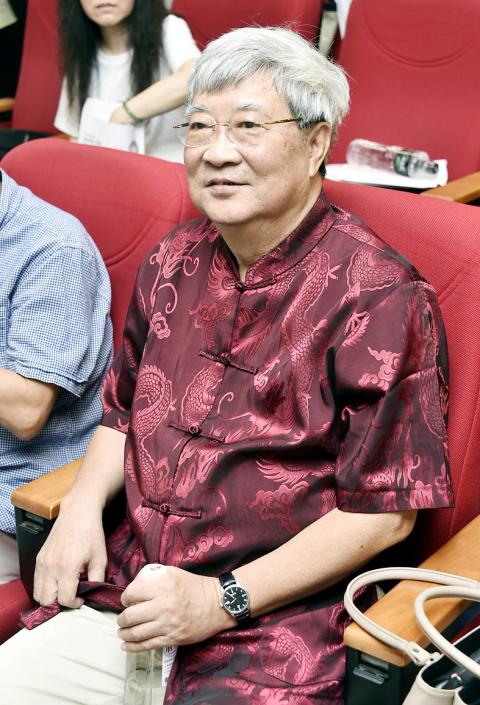Netizens yesterday accused the Chinese Nationalist Party (KMT) of using education as a propaganda tool for the promotion of its “one country, two areas” (一國兩區) formula, reacting to an article published by a news Web site in China featuring the convener of the Ministry of Education’s curricular adjustment committee, Wang Hsiao-po (王曉波).
Titled “Returning Taiwan’s History Textbooks to ‘One China’: Not Everyone is [former president] Lee Teng-hui (李登輝),” the article published by the Chinese media Web site Guancha.cn on April 29 has triggered heated discussion since it was reposted on the nation’s largest online academic bulletin board system, Professional Technology Temple (PTT), yesterday morning.
Shih Hsin University professor Wang was quoted in the article as saying that the reason adjustments were proposed to high-school curriculum guidelines three years after its implementation was because of misinformation in some history textbooks.

Photo: Chen Yi-chuan, Taipei Times
Some textbooks inaccurately described so-called “comfort women” as having volunteered to work in wartime brothels in Japan, he was quoted as saying.
“They also painted Taiwanese who were enlisted to serve in the Imperial Japanese Army during World War II as willingly joining the Japanese Army out of patriotism,” he said.
As former of the Chinese Unification Union vice chairman Wang has been a magnet for controversy.
His remarks often trigger an outpouring of fury from the online community, as did his recent accusation that Democratic Progressive Party chairperson Tsai Ing-wen (蔡英文) incited young students to stand up against curriculum changes.
The remark by Wang during a Taiwanese political talk show on Friday that “our country’s capital is Nanjing, but Taipei is the current capital of the Taiwan area” has also resulted in much criticism from netizens.
In the article published by Guancha.cn, Wang was quoted as saying that the biggest changes were made to the geography textbooks, which were drawn up based on the principle of “one country, two areas.”
The adjustments include a change from “China’s largest island is Hainan, while our country’s highest peak is Jade Mountain (玉山)” to “The largest island is Taiwan. Our nation’s highest peak is Mount Everest and its Taiwan area is surrounded by water,” Wang wrote.
Asked what kind of impact the curriculum adjustments had on the KMT’s campaign for next year’s presidential and legislative elections, Wang said they had created a strong cohesive force among pan-blue supporters.
“A lack of ‘national goals’ is a critical problem facing the KMT. The party requires more convincing rhetoric to persuade the public and that was exactly what we aimed to achieve through the curriculum changes,” Wang said in the article.
In an article published in the Chinese-language monthly magazine Straits Review (海峽評論) in September last year, titled “Textbooks on Japanese occupation and Taiwanese history” (日據與台灣史教科書), Wang wrote that the 2012 revisions of high-school curriculum guidelines were the result of compromises that were, in his opinion, “unsatisfactory, but acceptable.”
“After being incorporated with China-centric East Asian cultural history... the 2012 revisions allow Chinese history to take up more than two semesters of teaching hours,” Wang said.

PREPAREDNESS: Given the difficulty of importing ammunition during wartime, the Ministry of National Defense said it would prioritize ‘coproduction’ partnerships A newly formed unit of the Marine Corps tasked with land-based security operations has recently replaced its aging, domestically produced rifles with more advanced, US-made M4A1 rifles, a source said yesterday. The unnamed source familiar with the matter said the First Security Battalion of the Marine Corps’ Air Defense and Base Guard Group has replaced its older T65K2 rifles, which have been in service since the late 1980s, with the newly received M4A1s. The source did not say exactly when the upgrade took place or how many M4A1s were issued to the battalion. The confirmation came after Chinese-language media reported

The Taiwanese passport ranked 33rd in a global listing of passports by convenience this month, rising three places from last month’s ranking, but matching its position in January last year. The Henley Passport Index, an international ranking of passports by the number of designations its holder can travel to without a visa, showed that the Taiwan passport enables holders to travel to 139 countries and territories without a visa. Singapore’s passport was ranked the most powerful with visa-free access to 192 destinations out of 227, according to the index published on Tuesday by UK-based migration investment consultancy firm Henley and Partners. Japan’s and

A Ministry of Foreign Affairs official yesterday said that a delegation that visited China for an APEC meeting did not receive any kind of treatment that downgraded Taiwan’s sovereignty. Department of International Organizations Director-General Jonathan Sun (孫儉元) said that he and a group of ministry officials visited Shenzhen, China, to attend the APEC Informal Senior Officials’ Meeting last month. The trip went “smoothly and safely” for all Taiwanese delegates, as the Chinese side arranged the trip in accordance with long-standing practices, Sun said at the ministry’s weekly briefing. The Taiwanese group did not encounter any political suppression, he said. Sun made the remarks when

BROAD AGREEMENT: The two are nearing a trade deal to reduce Taiwan’s tariff to 15% and a commitment for TSMC to build five more fabs, a ‘New York Times’ report said Taiwan and the US have reached a broad consensus on a trade deal, the Executive Yuan’s Office of Trade Negotiations said yesterday, after a report said that Washington is set to reduce Taiwan’s tariff rate to 15 percent. The New York Times on Monday reported that the two nations are nearing a trade deal to reduce Taiwan’s tariff rate to 15 percent and commit Taiwan Semiconductor Manufacturing Co (TSMC, 台積電) to building at least five more facilities in the US. “The agreement, which has been under negotiation for months, is being legally scrubbed and could be announced this month,” the paper said,